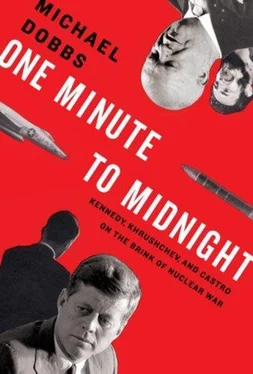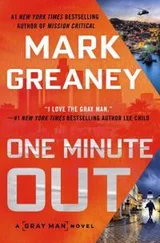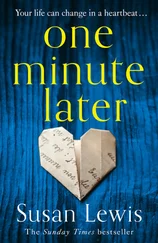“Change it a little,” instructed Kennedy. “Start again, Mr. Secretary.”
“You can cut the next sentence,” chimed in Bundy.
“‘Welcome the statement of your desire,’” said Rusk, reading back his notes. “Couldn’t we just say, ‘My desire is the same?’”
“My desire isn’t the same as his,” Kennedy objected. How about “I can assure you of the great interest of the people of the United States to find a satisfactory solution to this…”
“Interested in reducing tensions,” murmured the secretary of state.
“We have to fudge it somewhat,” conceded the president.
Rusk pressed on. “We are of course quite prepared to consider with our allies the suggestions that you and your partners in the Warsaw Pact might have in mind.”
The notion that the Soviet-dominated Warsaw Pact was an alliance of free nations was too much for the hawkish Bundy. “Do we have to talk about their ‘partners in the Warsaw Pact’? he interrupted peevishly. “What you [Khrushchev] have in mind.”
“Yeah, I think you oughta…” the president agreed.
Seated across the table from Jack, Bobby could no longer conceal his frustration. The cobbled-together draft was full of noble sentiments but didn’t actually say anything. Like Thompson, Bobby wanted to steer the exchange with Moscow back to the original Friday night proposal. He suggested his brother tell Khrushchev, “You made an offer to us, and we accept it. And you’ve also made a second offer, which has to do with NATO, and we’ll be glad to discuss that at a later time.”
The youngest and least experienced member of the ExComm, Bobby frequently veered between belligerence and inarticulateness. But he also had a knack for occasionally homing in on the essence of a problem. He sensed that the discussion in the ExComm was going around in circles, and that everybody was getting lost in a morass of commas and subordinate clauses. He urged his brother to permit him and Ted Sorensen to go off into another room and draft the reply to Khrushchev.
“Why don’t we try to work it out for you, without you being there to pick it apart?”
The suggestion drew laughter from the rest of the ExComm. Nobody else dared speak so frankly to the president. Bobby broke the tension again a couple of minutes later when Taylor announced that the Joint Chiefs were calling for massive air strikes against Cuba by Monday morning at the latest “unless there is irrefutable evidence in the meantime that offensive weapons are being dismantled.”
“Well, I am surprised.”
ExComm members were still debating what to do about the Turks and the Jupiters when they were jerked back to the present. More than four hours had passed without any news on the fate of Major Anderson. He was almost certainly dead, but it was unclear whether his disappearance over Cuba was due to an accident or enemy action. An intercepted Cuban communication settled the issue.
“The U-2 was shot down,” said McNamara, reading a note handed to him by an aide.
“Was the pilot killed?” Bobby wanted to know.
General Taylor had some more details. “The pilot’s body is in the plane.” The U-2 had likely been shot down over the town of Banes by a Soviet SAM missile. An American reconnaissance plane had picked up missile guidance radar signals from a SAM site near Banes at the same time as the U-2 overflight. “It all ties in in a very plausible manner.”
Kennedy was taken aback by the apparent Soviet “escalation.” There must have been a significant “change of orders” from Moscow. He began connecting the dots. A tough new message from Khrushchev earlier in the day following more conciliatory signals on Friday. Antiaircraft fire against low-level U.S. Navy reconnaissance planes. And now a U-2 shot down. The outlook suddenly seemed very bleak. Mixing metaphors somewhat, Bobby Kennedy would later describe a sense in the room that “the noose was tightening on all of us, on Americans, on mankind, and that the bridges to escape were crumbling.”
“They’ve fired the first shot,” said Paul Nitze, the hard-line assistant secretary of defense.
The immediate question was how to respond.
“We can’t very well send a U-2 over there, can we now, and have a guy killed again tomorrow,” said the president.
Taylor agreed. “We certainly shouldn’t do it until we retaliate, and say that if they fire again on one of our planes that we will come back with great force.”
“We ought to go in at dawn and take out that SAM site,” said McNamara.
His deputy, Gilpatric, argued that the downing of the U-2 was more ominous than the antiaircraft fire against the low-level planes. The antiaircraft batteries were probably manned by Cubans, but the SAM missiles were almost certainly controlled by Soviets.
“This is a change of pattern,” concluded McNamara, thinking aloud. “Now why it’s a change of pattern, I don’t know.”
5:50 P.M. SATURDAY, OCTOBER 27 (12:50 A.M. SUNDAY, MOSCOW)
The families of the U-2 pilots lived alongside each other at Laughlin Air Force Base outside Del Rio, Texas, a small town on the Mexican border surrounded by cactus and sagebrush. The 4080th Strategic Wing, which consisted of one U-2 squadron with about twenty-five pilots, was a large, rambunctious family. The Air Force had built brand-new bungalows on good-size lots for the pilots. Their social life revolved around bridge parties and church and backyard barbecues. Rudolf Anderson, Sr., and his wife, Jane, were pillars of the bridge-playing set, together with their best friends, Robert and Marlene Powell, who had children around the same age.
The pilots’ wives had little information about what was taking place in the skies over Cuba. Their husbands all disappeared at the start of the crisis, without saying very much about what they were doing. The women were left to fend for themselves, stockpile canned food, and tape up their windows in case of a Soviet attack. As they tried to preserve a semblance of routine, there was one sight that encapsulated all their fears: a chaplain and a colonel walking up the driveway with serious expressions on their faces.
Jane Anderson had already been through this ghastly routine. A few months earlier, the Air Force had reported that Rudy had been killed in a U-2 crash during a refueling exercise. It turned out to be a false report. There had been a mix-up in the manifest, and another pilot had died. Shortly before the Air Force officers showed up on Jane’s doorstep to deliver the news, Rudy called to let her know that he was okay. It took some time to sort out the confusion.
When the Air Force staff car appeared in the officer housing complex on Saturday afternoon, the women looked out of their windows to see where it was headed. As the car carrying the colonel and the chaplain passed their houses, everybody breathed a sigh of relief. Finally, the officers got out of the car and went looking for Marlene Powell. She assumed that something had happened to her husband. Instead, they asked her to accompany them across the street to the Anderson bungalow. Definitive word on what had happened to Rudy had still not reached Del Rio. All that was known was that he had gone missing over Cuba.
When she heard the knock on her door, Jane ran into the bathroom and refused to come out. Marlene tried to comfort her through the locked door.
“Don’t get worried,” she told her friend, who was stifling her sobs. “There’s still hope.”
When Jane finally reappeared in the living room, an Air Force doctor wanted to give her a drug to calm her nerves. Marlene took the doctor aside. As Jane’s best friend, she knew something nobody else knew.
“Don’t give her anything,” she whispered. “She’s pregnant.”
Читать дальше












